The Deployment Toolkit
Military Life
Military Life is a series of books for service members and their families who must deal with the significant yet often overlooked difficulties unique to life in the military. Each of the titles in the series is a comprehensive presentation of the problems that arise, solutions to these problems, and resources that are of much further help. The authors of these bookswho are themselves military members and experienced writershave personally faced these challenging situations and understand the many complications that accompany them. This is the first stop for members of the military and their loved ones in search of information on navigating the complex world of military life.
- The Military Marriage Manual: Tactics for Successful Relationships by Janelle Hill, Cheryl Lawhorne, and Don Philpott (2010)
- Combat-Related Traumatic Brain Injury and PTSD: A Resource and Recovery Guide by Cheryl Lawhorne and Don Philpott (2010)
- Special Needs Families in the Military: A Resource Guide by Janelle Hill and Don Philpott (2010)
- Military Finances: Personal Money Management for Service Members, Veterans, and Their Families by Cheryl Lawhorne-Scott and Don Philpott (2013)
- Sexual Assault in the Military: A Guide for Victims and Families by Cheryl Lawhorne-Scott, Don Philpott, and Jeff Scott (2014)
- Raising Children in the Military by Cheryl Lawhorne-Scott, Don Philpott, and Jeff Scott (2014)
- The Deployment Toolkit: Military Families and Solutions for a Successful Long-Distance Relationship by Janelle B. Moore and Don Philpott
The Deployment Toolkit
Military Families and Solutions for a Successful Long-Distance Relationship
Janelle B. Moore and Don Philpott
Rowman & Littlefield
Lanham Boulder New York London
Published by Rowman & Littlefield
A wholly owned subsidiary of The Rowman & Littlefield Publishing Group, Inc.
4501 Forbes Boulevard, Suite 200, Lanham, Maryland 20706
www.rowman.com
Unit A, Whitacre Mews, 26-34 Stannary Street, London SE11 4AB
Copyright 2016 by Rowman & Littlefield
All rights reserved . No part of this book may be reproduced in any form or by any electronic or mechanical means, including information storage and retrieval systems, without written permission from the publisher, except by a reviewer who may quote passages in a review.
British Library Cataloguing in Publication Information Available
Library of Congress Cataloging-in-Publication Data
Names: Moore, Janelle, 1972 author. | Philpott, Don, 1946 author.
Title: The deployment toolkit : military families and solutions for a successful long-distance relationship / Janelle B. Moore and Don Philpott.
Other titles: Military families and solutions for a successful long-distance relationship
Description: Lanham, MD : Rowman & Littlefield, [2016] | Series: Military life | Includes index.
Identifiers: LCCN 2016003349 | ISBN 9781442254282 (cloth : alk. paper)
Subjects: LCSH: SoldiersFamily relationshipsUnited StatesHandbooks, manuals, etc. | Deployment (Strategy)Psychological aspects. | Long-distance relationshipsUnited States. | Military spousesUnited StatesHandbooks, manuals, etc. | Families of military personnelUnited StatesHandbooks, manuals, etc. | United StatesArmed ForcesMilitary lifeHandbooks, manuals, etc.
Classification: LCC UB403 .M673 2016 | DDC 355.1/20973dc23 LC record available at http://lccn.loc.gov/2016003349
 The paper used in this publication meets the minimum requirements of American National Standard for Information SciencesPermanence of Paper for Printed Library Materials, ANSI/NISO Z39.48-1992.
The paper used in this publication meets the minimum requirements of American National Standard for Information SciencesPermanence of Paper for Printed Library Materials, ANSI/NISO Z39.48-1992.
Printed in the United States of America
Dedications
As a child I couldnt understand why my father wouldnt take us to see the fireworks. I really couldnt understand what self-medication looked like because I didnt have anything else to compare it to. We werent allowed to talk about certain things in my household. There were no labels for what we know today as Post Traumatic Stress Disorder (PTSD). It starts with deployments and separations in many cases.
That Others May Live
For my dad, Captain E. Roy Moore, USMC, CallSign PlayBoy 13, the Mustang who participated as the first A-1 Pilot on the scene in the daring search, extraction, and rescue of wounded fellow pilot and Marine officer Capt. Gary Bain USMC (Ret.) on May 11, 1969. It was not until I was in my forties that I learned of one of my fathers brave acts of heroism in the line of duty. I understand that he nearly or did exhaust the fuel in his jet, as well as his ordnance, protecting Captain Bain, who was severely injured in the crash when shot down in hostile territory. Im told that he would not leave despite being called back; while protecting and providing cover for Capt. Bain. He chose to stay despite the risk to himself and his aircraft, and despite the fact that the inbound rescue party was being recalled due to heavy fire and weather. Im grateful for his bravery as well as that of the equally courageous pilot of the refueling jet, who risked his life and his aircraft to come in from the ocean to refuel my fathers jet so that he could continue to provide cover fire and a deterrent presence from surrounding enemy fire for Capt. Bain until he could be reached for extraction by the Jolly Greens. Sometimes the real heroes never talk of what theyve endured, or decades later still endure; and we have to acknowledge how proud we are of their selfless acts of service and valor for our country as well as for their fellow servicemen and women and provide them the support they need when they come home. Stories like these need to be told and shared, but in the case of many of these individuals, their time in war affected them so deeply they could not, even if they relive some part of it every single day decades later. If youd like to know more about the rescue mission, Capt. Bain tells some of the incredible story of his survival in the face of certain captivity or death here: http://www.videoexplorers.com/2nd_ejection.htm.
Thank you, Roy Moore, for having Savannahs and my six; my contribution to this manuscript is dedicated to your service, your bravery, and your sacrifices.
Don Philpott dedicates this book to Mary Osterman Mai, who passed away on October 13, 2015, three days after her thirty-fifth birthday. Mary, daughter of Jenny and Bob Osterman, was a disabled veteran having served two tours of duty in Iraq. We owe her and her fellow warriors so much.
Acknowledgments
Many thanks to all of those who contributed their trust, confidence, and experience onbut mostly offthe record; with special acknowledgement to Michelle Mo Barrett and Jennifer Crossman; Dr. Barbara Van Dahlen, Give an Hour foundation; the NCSU MCF Brothers, Callsign Draino D.T., L.E., M.C., R.B., and C.B.; and L. Mazucca.
Introduction
Since September 11, 2001, more than 2 million service members have deployed to Iraq or Afghanistan. Many have been separated from their families for extended periods. Only recently have we started to fully appreciate the extent of the mental and physical strains that these separations and deployments impose on both the service members and their families and friends.
Any separation from loved ones is an emotionally difficult time for all concerned, especially when children are involvedbut separation is now a modern day military reality. Homesteadingwhere a military family stays in place for an extended period of timeis a thing of the past. The average Permanent Change of Station (PCS) is three years in duration, meaning career military can expect to be in a near-constant state of transition.
As a result, military families must learn to adapt to long-distance relationships as well as how to adjust and positively cope with separations for various training deployments and real-life exercises. On the positive side, there is a lot of help available. The military is a huge family with scores of support groups, both official and unofficial, to help families prepare for separation and the stresses associated with the long absences. More importantly, help is usually available if needed, for when the service member returns home after the separation. Even under the best circumstances, if the separation has been a long one, reintegration into full family life can be very difficult for all concerned.
Next page
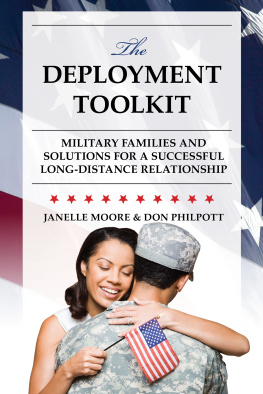

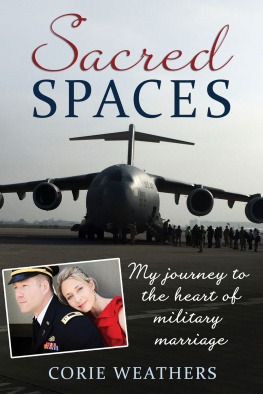
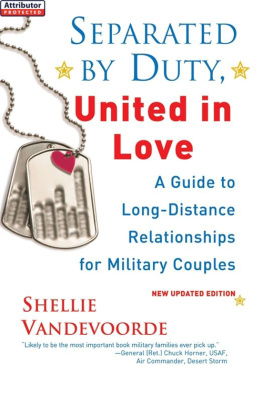
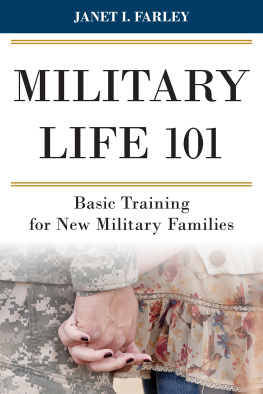
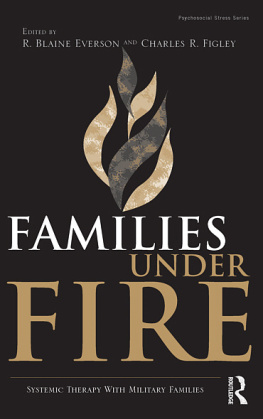
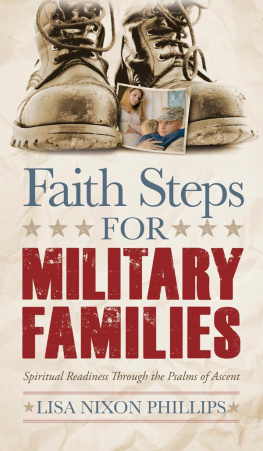

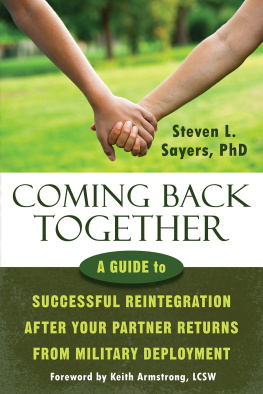
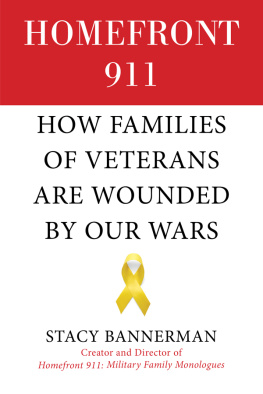
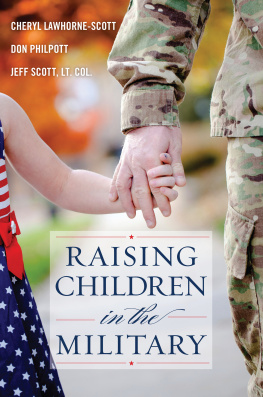
 The paper used in this publication meets the minimum requirements of American National Standard for Information SciencesPermanence of Paper for Printed Library Materials, ANSI/NISO Z39.48-1992.
The paper used in this publication meets the minimum requirements of American National Standard for Information SciencesPermanence of Paper for Printed Library Materials, ANSI/NISO Z39.48-1992.